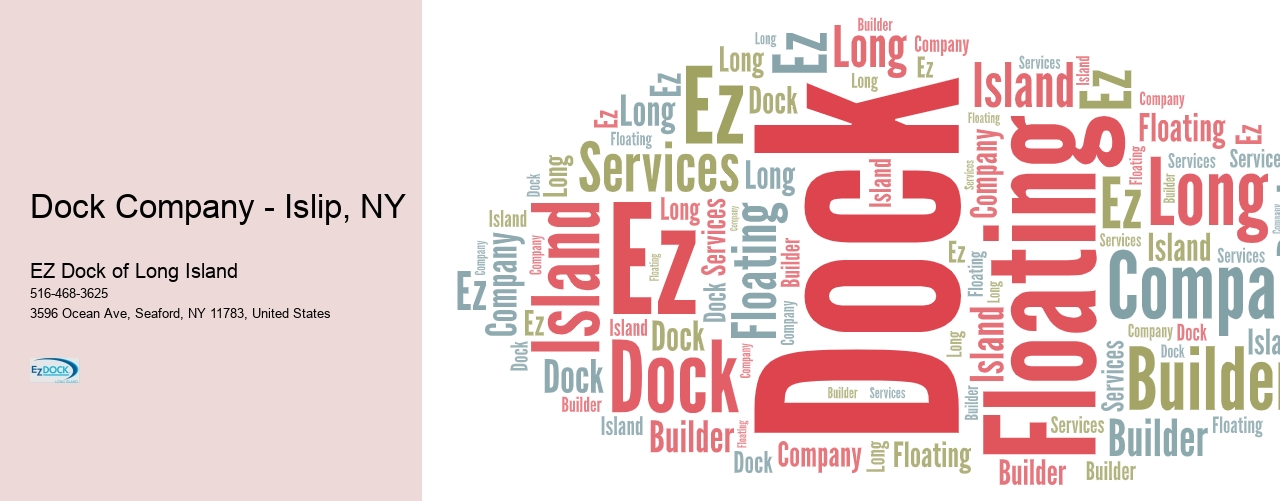

With 15+ years of expertise, EZ Dock of Long Island is a leader in floating dock systems for Long Island’s waterfront. We offer a full range of modular docks, from PWC ports to jet ski docks and boat lifts, with designs that allow for easy customization and expansion. Whether you're a homeowner, marina, or government agency, we provide the perfect docking solution.
Floating docks are an innovative way to extend the usable space of waterfront properties where expansion options may be limited by physical or regulatory constraints. These dynamic structures float on the water's surface and can be configured in various layouts to suit a wide range of needs, from personal leisure use to commercial marina applications. By adapting to changing water levels, they provide stable access points that can accommodate boats, jet skis, and other watercraft without compromising shoreline integrity or requiring extensive construction.
One of the key benefits of floating docks is their modular design. Individual components can be easily connected in different configurations, allowing property owners to customize their waterfront setup as needed. This versatility is particularly useful for areas with irregular coastlines or those looking to optimize space for specific activities such as fishing, swimming, or social gatherings. The ability to reconfigure these docks also means that they can evolve alongside the changing demands of a bustling waterfront business or adapt to the shifting seasons and water conditions.
Floating dock systems are increasingly recognized for their environmental benefits. Many designs minimize disruption to aquatic ecosystems by allowing light penetration and water circulation beneath them, which is essential for maintaining healthy marine habitats. Additionally, materials used in modern floating docks often include recycled plastics or eco-friendly composites that withstand harsh marine environments while reducing the ecological footprint. For waterfront areas where conservation is paramount, floating docks present a sustainable option that aligns with eco-conscious objectives.
For commercial ventures like marinas and watersport rental companies, floating docks offer significant economic advantages over traditional fixed structures. Their ease of installation and removal reduces labor costs and allows businesses to respond quickly to market demands without enduring lengthy construction periods. Operational efficiency is increased since these docks can be repositioned closer to clients during peak seasons or moved out of harm's way in advance of inclement weather conditions—saving both time and money on potential repairs.
In conclusion, floating docks address challenges associated with limited waterfront space by offering flexible configurations that maximize utility while embracing sustainability and delivering economic benefits for businesses operating near water bodies.
View Floating Dock Company - Suffolk County in a full screen map
| Service Areas | Amityville, NY; Asharoken, NY; Babylon, NY; Bay Shore, NY; Bayport, NY; Bellport, NY; Blue Point, NY; Brightwaters, NY; Bridgehampton, NY; Brookhaven, NY; Center Moriches, NY; Centerport, NY; Cold Spring Harbor, NY; Copiague, NY; Cutchogue, NY; East Islip, NY; East Marion, NY; East Moriches, NY; East Quogue, NY; East Rockaway, NY; East Setauket, NY; Eastport, NY; Eatons Neck, NY; Flanders, NY; Greenport, NY; Great River, NY; Hampton Bays, NY; Huntington, NY; Islip, NY; Jamesport, NY; Lindenhurst, NY; Lloyd Harbor, NY; Mattituck, NY |
| Entity | Definition |
|---|---|
| Floating Docks | Modular docks that float on the water surface, often used for boats, swimming, and other water activities. |
| Floating Dock Builder | A company or professional that specializes in building floating docks for residential or commercial use. |
| Floating Dock Company | A business that provides the design, construction, and installation of floating docks. |
| Floating Dock Services | Services related to the maintenance, repair, or installation of floating docks. |
| Dock Company | A company that specializes in the construction and services of docks, both floating and fixed types. |
Enjoy Your Life on The Dock With EZ Dock" width="853">
Floating docks offer a significant environmental advantage because they don't necessitate extensive alterations to the seabed or shoreline. Traditional dock construction can involve dredging, driving pilings, and permanent structures that disrupt marine habitats and ecosystems. In contrast, floating docks have minimal contact with the bottom of the water body, reducing their impact on important ecological areas such as oyster beds, seagrass meadows, and coral reefs. This design preserves underwater environments allowing aquatic life to flourish undisturbed.
Climate change brings about rising sea levels and more extreme weather conditions, which can lead to fluctuating water levels in lakes, rivers, and oceans. Floating docks are inherently adaptive; they rise and fall with the water level, offering resilience against flooding and erosion that often accompany such changes. This adaptability not only protects the dock itself from damage but also minimizes shoreline degradation by reducing the need for corrective measures like additional revetment structures or frequent repairs.
Traditional docks often require chemical treatments to protect materials like wood from rotting or being destroyed by marine borers. These chemicals can leach into the water over time, causing harm to aquatic organisms. Floating docks frequently utilize more durable materials that are resistant to decay and infestation without harmful treatments. By eliminating this source of pollution, floating docks contribute to maintaining cleaner waterways.
Innovation in floating dock technology has led to increased use of recycled plastics and other eco-friendly materials in their construction. These sustainable choices not only divert waste from landfills but also provide long-lasting durability with reduced maintenance requirements compared to traditional materials like wood or steel that may rust or degrade quickly in aquatic environments. The longevity of these materials means less frequent replacement and repair - a win for both cost savings and environmental conservation.
Some floating dock companies are integrating renewable energy solutions into their products by creating platforms for solar panels or small wind turbines above water bodies where space is otherwise unused. This unique application serves dual purposes: providing stable infrastructure for clean energy generation while avoiding further development on untouched land spaces. Such innovative uses contribute positively towards reducing carbon footprints by harnessing nature's power without causing harm below the surface.